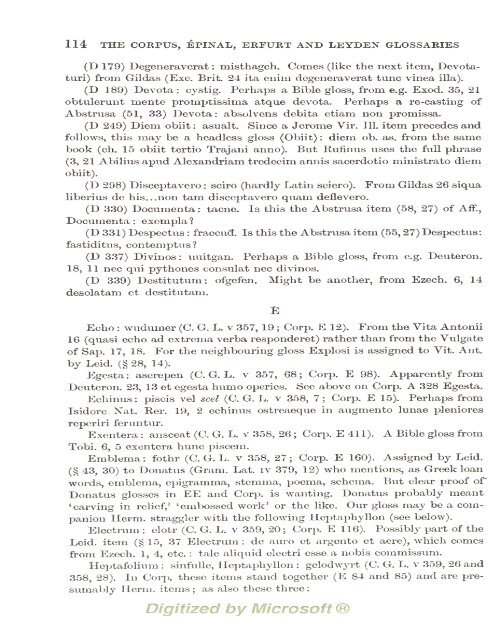the corpus, épinal, erfurt and leyden glossaries, viii - World eBook ...
the corpus, épinal, erfurt and leyden glossaries, viii - World eBook ...
the corpus, épinal, erfurt and leyden glossaries, viii - World eBook ...
Create successful ePaper yourself
Turn your PDF publications into a flip-book with our unique Google optimized e-Paper software.
114 THE CORPUS, EPINAL, ERFURT AND LEYDEN GLOSSARIES<br />
(D 179) Degeneraverat : misthagch. Comes (like <strong>the</strong> next item, Devota-<br />
turi) from Gildas (Exc. Brit, 24 ita euim degeneraverat tunc vinea ilia).<br />
(D 189) Devota :<br />
cystig. Perhaps a Bible gloss, from e.g. Exod. 35, 21<br />
obtulerunt mente promptissima atque devota. Perhaps a re-casting of<br />
Abstrusa (51, 33) Devota: absolvens debita etiam nou promissa.<br />
(D 249) Diem obiit : asualt. Since a Jerome Vir. 111. item precedes <strong>and</strong><br />
follows, this may be a headless gloss (Obiit) : diem<br />
ob. as. from <strong>the</strong> same<br />
book (ch. 15 obiit tertio Trajani anno). But Rufinus uses <strong>the</strong> full phrase<br />
(3, 21 Abilius apud<br />
obiit).<br />
Alex<strong>and</strong>riam tredecim annis sacerdotio ministrato diem<br />
(D 298) Disceptavero : sciro (hardly Latin sciero). From Gildas 26 siqua<br />
liberius de his...non tam disceptavero quam deflevero.<br />
(D 330) Documenta: tacne.<br />
Documenta : exempla<br />
Is this <strong>the</strong> Abstrusa item (58, 27) of AflF.,<br />
:<br />
?<br />
(D 331) Despectus : fraecud. Is this <strong>the</strong> Abstrusa item (55, 27) Despectus:<br />
fastiditus, contemptus?<br />
(D 337) Divinos : uuitgan. Perhaps a Bible gloss, from e.g. Deuteron.<br />
18, 11 nee qui pythones consulat nee divinos.<br />
(D 339) Destitutum : ofgefen. Might be ano<strong>the</strong>r, from Ezech. 6, 14<br />
desolatam et destitutam.<br />
Echo :<br />
wudumer<br />
(C. G. L. v 357, 19 ; Corp. E 12). From <strong>the</strong> Vita Antonii<br />
16 (quasi echo ad extrema verba responderet) ra<strong>the</strong>r than from <strong>the</strong> Vulgate<br />
of Sap. 17, 18. For <strong>the</strong> neighbouring gloss Explosi is assigned to Vit. Ant.<br />
by Leid. (§ 28, 14).<br />
Egesta : ascrepen (C. G. L. v 357, 68 ; Corp. E 98). Apparently from<br />
Deuteron. 23, 13 et egesta humo operies. See above on Corp. A 328 Egesta.<br />
Echinus: piscis vel seel (C. G. L. v 358, 7; Corp. E 15). Perhaps from<br />
Isidore Nat. Rer. 19, 2 echinus ostreaeque in augmento lunae pleniores<br />
reperiri feruntur.<br />
Exentera : ansceat (C. G. L. v 358, 26 ; Corp. E 411). A Bible gloss from<br />
Tobi. 6, 5 exentera hunc piscem.<br />
Erablema :<br />
fothr<br />
(C. G. L. v 358, 27 ; Corp. E 160). Assigned by Leid.<br />
(§ 43, 30) to Donatus (Gram. Lat. iv 379, 12) who mentions, as Greek loan<br />
words, emblema, epigramma, stemma, poema, schema. But clear proof of<br />
Donatus glosses in EE <strong>and</strong> Corp. is wanting. Donatus probably meant<br />
'carving in relief,' 'embossed work' or <strong>the</strong> like. Our gloss may<br />
panion Herm. straggler with <strong>the</strong> following Heptaphyllon (see below).<br />
Electrum :<br />
be a com-<br />
elotr (C. G. L. v 359, 20; Corp. E 116). Possibly part of <strong>the</strong><br />
Leid. item (§ 15, 37 Electrum: de auro et argento et acre),<br />
from Ezech. 1, 4, etc. : tale aliquid clectri esse a nobis commissum.<br />
Heptafolium : sinfulle, Heptaphyllon :<br />
gelodwyrt<br />
which comes<br />
(C. G. L. v 359, 26 <strong>and</strong><br />
358, 28). In Corp. <strong>the</strong>se items st<strong>and</strong> toge<strong>the</strong>r (E 84 <strong>and</strong> 85) <strong>and</strong> are pre-<br />
sumably Herm. items ;<br />
as also <strong>the</strong>se three :<br />
'

















